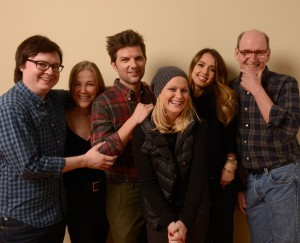A.C.O.D.
Posted on October 4, 2013 at 7:30 am
B+| Lowest Recommended Age: | Mature High Schooler |
| MPAA Rating: | Rated R for language and brief sexual content |
| Profanity: | Very strong language, some crude |
| Alcohol/ Drugs: | Drinking, drug references |
| Violence/ Scariness: | Tense family confrontations, some shoving, fire |
| Diversity Issues: | Diverse characters |
| Date Released to Theaters: | October 4, 2013 |
 Are today’s 20-and 30-somethings the least-parented generation in history, as a character explains in this film? To quote Rosie O’Donnell in “Sleepless in Seattle” about another depressing statistic, “It’s not true, but it feels true.” While the generation that came of age in the 1970’s and early 80’s were self-actualizing and consciousness-raising and yuppifying, their children were being raised by adults who were too often acting like, well, children.
Are today’s 20-and 30-somethings the least-parented generation in history, as a character explains in this film? To quote Rosie O’Donnell in “Sleepless in Seattle” about another depressing statistic, “It’s not true, but it feels true.” While the generation that came of age in the 1970’s and early 80’s were self-actualizing and consciousness-raising and yuppifying, their children were being raised by adults who were too often acting like, well, children.
Adam Scott (“Parks and Recreation,” “Party Down”) produced and stars in “A.C.O.D.,” which stands for “Adult Children of Divorce.” It’s an apt oxymoron. Scott plays Carter, who is very much the adult in his relationship with his long-divorced but still-warring parents and with his younger brother, Trey (Clark Duke). He is also the adult in his professional life, as the owner of a trendy restaurant. But that has a considerable advantage, he points out. “It may be like a family, but I could fire the ones I don’t like.”
Trey’s engagement creates some immediate problems. He and his fiancée Kieko (Valerie Tian) have only known each other four months. Trey cannot support himself; he is living in Carter’s garage. But those are minor concerns compared to the “9 year marriage turned into a 100-years war” — their parents, Hugh (Richard Jenkins) and Melissa (Catherine O’Hara). Trey wants them to come to his wedding and be civil to one another. Even though both have re-married (Hugh twice), their toxic mutual hostility is still the most powerful and all-consuming force in their lives.
Carter, himself allergic to marriage due to the childhood trauma of his parents’ divorce (and their self-absorption, bitterness, manipulation, and use of him as a go-between and subject of endless custody disputes), knows that Trey’s plans are unrealistic. But he can’t help being captivated, even a little wistful and the optimism and certainty of the couple. And he knows it is in part because he has worked so hard to protect Trey from the worst of his parents’ battles.
The stress of negotiating with his parents is so unsettling, Carter seeks help from a woman he saw after his parents split up (Jane Lynch). She is glad to see him again, but informs him that she was not his therapist. She was interviewing him for a book about the impact of divorce on children. And it became an international best-seller. This puts him even deeper into a tailspin, as he reads the book for the first time and discovers what his middle-school turmoil looked like to an observer. “Am I living in a shell of insecurity and approval-seeking?” It is even more disconcerting that the book is a best-seller (“Fourteen printings and Margot Kidder did the audio book.”)
Meanwhile, his efforts to get his parents to be civil to one another has had some very disturbing repercussions. And Carter’s sympathetic and supportive girlfriend of four years (the magnificent Mary Elizabeth Winstead) may not put any pressure on him, but she does point out that it would be nice to have a key to his apartment.
The storyline may be weak in spots, but the spectacular cast (Scott’s “Parks and Recreations” co-star Amy Poehler plays Hugh’s third wife) makes the most of the sharp dialogue and depictions of world-class boundary issues. A credit-sequence coda with the movie’s real-life crew discussing their own A.C.O.D. issues is, like the film itself, sobering but still a reminder that ultimately, no matter how dysfunctional our origins, we get to decide who we want to be.
Parents should know that this film includes explicit sexual references and brief situations, rear nudity, very strong language, drinking, smoking, and drug references.
Family discussion: Why was Carter unhappy about the way he was portrayed in the book? How did he try to be different from his parents?
If you like this, try: “It’s Complicated” and “The Baxter”
